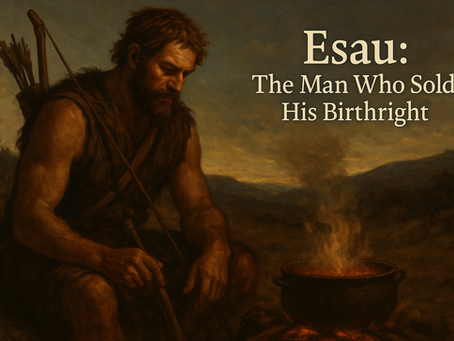top of page


Jacob the Deceiver: Grace for the Trickster
Jacob the Deceiver: Grace for the Trickster. Jacob’s story is one of the most paradoxical in Scripture. Chosen by God before birth, yet marked by deceit and scheming, Jacob embodies the tension between divine election and human frailty. His name itself, Yaʿaqov (יַעֲקֹב), means “heel-grabber” or “supplanter,” pointing to his grasping nature.
3 min read


The Reconciliation of Jacob and Esau: Forgiveness in the Desert
The Reconciliation of Jacob and Esau: Forgiveness in the Desert. The story of Jacob and Esau begins in rivalry but does not end in hatred. After years of deceit, exile, and fear, Genesis records a surprising turn: Esau, the wronged brother, runs to embrace Jacob. This reconciliation is one of Scripture’s most profound pictures of forgiveness, a reminder that even bitter wounds can be healed.
3 min read


Wrestling With God: Jacob at Peniel
Wrestling With God: Jacob at Peniel. Few passages in Scripture are as mysterious and arresting as Jacob’s night at the Jabbok, where he wrestles until daybreak with a divine figure. The account in Genesis 32 is not merely about physical struggle but about identity, blessing, and transformation. It is a story that touches on fear, persistence, weakness, and grace—all culminating in Jacob receiving a new name: Israel.
3 min read


The Birthright and the Blessing: More Than a Bowl of Stew
The Birthright and the Blessing: More Than a Bowl of Stew. Few biblical stories capture the danger of undervaluing God’s promises as vividly as Esau trading his birthright for a bowl of lentil stew. The account is often reduced to a cautionary tale about impatience or bad decision-making, but Scripture presents something much deeper. The distinction between birthright and blessing is essential, as both carried spiritual weight that foreshadowed Christ.
3 min read


Jacob I Loved, Esau I Hated: Understanding Romans 9
Jacob I Loved, Esau I Hated: Understanding Romans 9. Few phrases in Scripture generate more debate than Paul’s quotation in Romans 9: “Jacob I loved, but Esau I hated.” On the surface, these words sound harsh, as though God arbitrarily despises individuals. For centuries, theologians, pastors, and everyday believers have wrestled with this verse, its Old Testament background, and its implications for God’s character.
4 min read


Jacob: The Deceiver Transformed into Israel
Jacob: The Deceiver Transformed into Israel. Jacob, the younger son of Isaac and Rebekah and the twin of Esau, is one of the central figures in Genesis. His life was marked by struggle, deceit, and divine encounters. Yet despite his flaws, God chose Jacob to carry forward the covenant, renaming him Israel and making him the father of the twelve tribes.
5 min read


Esau: The Man Who Sold His Birthright
Esau: The Man Who Sold His Birthright. Esau, the elder son of Isaac and Rebekah, is remembered in Scripture as the man who traded his inheritance for a single meal. His life embodies the tension between immediate desires and eternal promises, and his legacy illustrates both the consequences of disregarding God’s covenant and the possibility of reconciliation.
4 min read


Laban: The Opportunist Brother and Father-in-Law
Laban: The Opportunist Brother and Father-in-Law. Laban first enters the biblical narrative as the brother of Rebekah in Genesis 24. He welcomed Abraham’s servant into their household and helped arrange Rebekah’s marriage to Isaac. Later, Laban becomes central in Jacob’s story as his uncle and eventual father-in-law, remembered for his cunning and opportunism.
3 min read


What The Bible Says About Israel
What The Bible Says About Israel. When most people hear the word “Israel,” they think of a modern nation in the Middle East. But Biblical Israel is not simply a country—it is a covenant people formed by God, for God. The Scriptures present Israel not as a mere geopolitical entity, but as a theological reality that unfolds across redemptive history.
3 min read
bottom of page